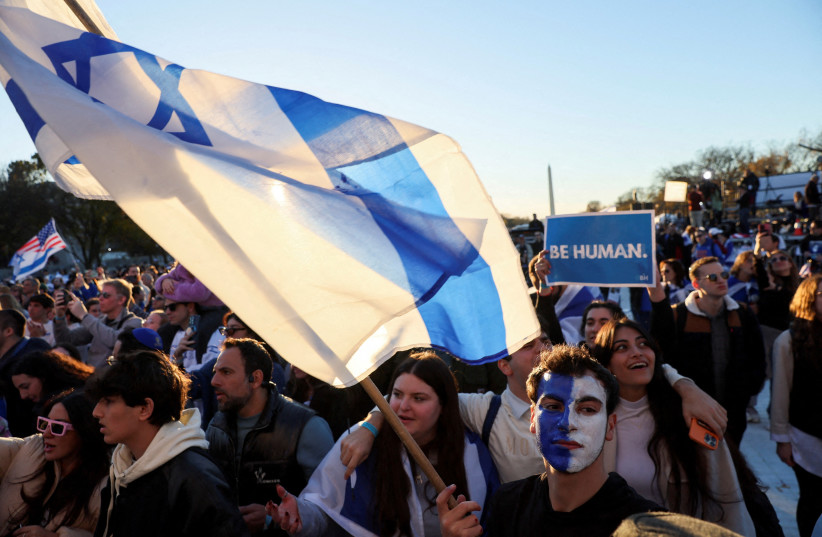Next month I will travel to Israel. Along with thousands of other young American Jews, I’ve decided to spend a few weeks volunteering with local organizations and connecting with my Israeli peers.
As I’ve been breaking the news of my upcoming trip to family and friends, the most common reaction I receive is a concerned and skeptical “why?” Why do you want to fly into a war zone? Aren’t you concerned for your safety? What will people think of you for publicly supporting Israel? Why take the risk?
In the weeks following October 7, I have felt isolated, frustrated, angry, and afraid. I’ve watched my friends, colleagues, and former classmates almost immediately ignore, minimize, or justify the atrocities of Hamas. I’ve seen antisemitism rage on the campus I called home just a few years ago. Organizations, politicians, and public figures who I once admired for their work in building a more inclusive, equal, and prosperous world have been silent or antagonistic to the concerns of American Jews.
We’ve all heard the message loud and clear: in the spaces that so many of us have occupied, among those dedicated to combating hatred, to uplifting and protecting minority communities, to opposing terrorism and denouncing the abuse of women, Jews don’t count. The shocking realization that so many around me are ambivalent, or worse, to our fate has been terrifying.
So like many of my peers, I’m left wondering what will come of the Jewish people’s ability to continue living safely and prosperously in America. And as I’ve felt repelled by the people and places that used to feel like home, I feel closer and more connected than ever to the Jewish community and to Israel.

At the same time, I’m overwhelmed by what I do not know about the place and the people that I feel so compelled to defend. This newfound connectedness has left me with more questions than answers.
Who are these people with whom I share a common history and religious identity but not a common language or lifestyle? What are the sights, sounds, flavors, and smells of the land where we share a common heritage? How can I live comfortably in America while Israelis my age are fighting for their survival? What are my obligations to the Jewish people during this time of crisis?
So why am I going to Israel? For me, going to Israel is a first step in answering these questions.
I’m going to Israel to bear witness to the atrocities committed by Hamas. I want to understand the scope of the horrors of October 7 and the lasting impact the day has made on Israeli society. I want to hear the stories of those murdered, kidnapped, and injured. I want to witness the strength and resolve of the Israeli people as they work to defeat Hamas and ensure that these atrocities can never happen again.
Doing what's possible to help
I’m going to Israel to do what I can to help. Israel has faced unprecedented food and labor shortages due to the war, particularly on farms near Gaza that were attacked on October 7. While in Israel, I’ll spend the majority of my time volunteering to harvest produce on these farms, pack food shipments, and assist with supplies for displaced Israelis and the IDF.
I’m going to Israel to show solidarity with the Israeli people. We say that the Jewish people are am echad v’lev echad – one people with one heart. When one Jew is hurting, we all feel the pain. I want to make sure that the Israeli people know that American Jews share in the devastation they are experiencing and that we are there to support them in this time of need. I look forward to connecting with Israelis my age and hearing their stories.
I’m going to Israel to learn more about its history, culture and people. I want to get to know more Israelis and understand their perspectives. I want to visit museums and learn more about the history of the State of Israel and the peoples that call it home. And I want to visit beaches, bars, and restaurants to experience the culture and joy of Israeli society.
And lastly, I’m going to Israel to say to those around me that despite the hatred, the silence, and the indifference you have shown, the Jewish people will not be deterred. We will not disregard our connection to our ancestral homeland. We will not turn our backs on each other and subscribe to your taxonomy of good Jews and bad Jews. And we will not be ashamed of the only Jewish state the world has ever known. I want to say loudly and clearly to those around me: Am Yisrael Chai, a Hebrew phrase that translates to The People of Israel Live.
The writer graduated from Yale University in 2021. In 2020, he was college director of Jews for Joe, an organization of young Jews dedicated to growing support for the Biden campaign. He has previously published articles on Jewish-related topics in the Jewish Journal and the Yale Daily News.
